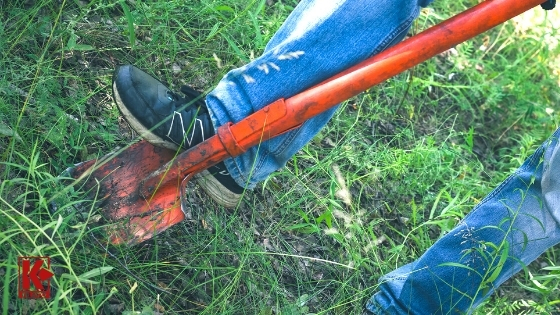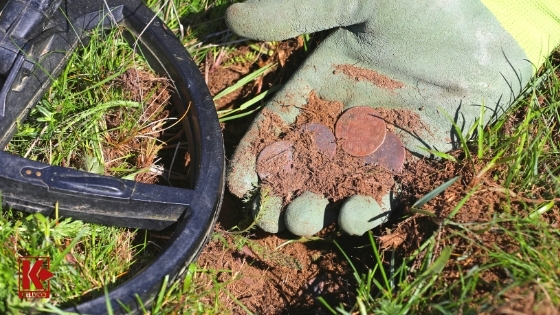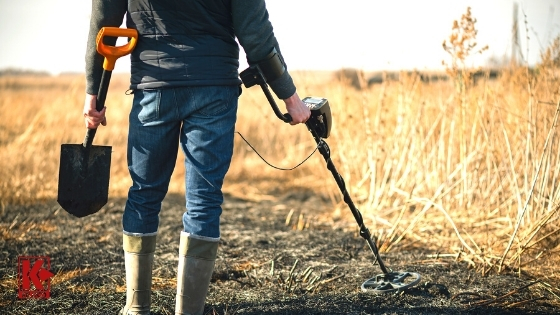Best Metal Detector for Beginners
Published by John Matuszak on 08/25/21
When you are first starting in the world of metal detecting, picking the best metal detector for beginners might seem overwhelming. While metal detectors vary in many ways, the basic performance of a metal detector is the same.
You do not need to break the bank when starting, and there are times we would actually discourage this. Finding the best entry-level metal detector is quite simple.
Pick out a well-rounded metal detector with good performance, practice with it, and once you have decided you need an upgrade, sell it and get an upgrade!
Keep this in mind: All metal detectors and golf clubs will, respectively, find metal and hit golf balls. You don’t have to have a high-end metal detector to find metal, just as you don’t need a fancy golf club to hit a ball.

Digging up a metal detected spot
Continue reading this guide from the experts at Kellyco to learn about the best beginner metal detectors and the factors that you should be aware of when picking one out so you don’t choose the wrong one for your scenario.
Not sure where to start? Read our section on "What to Look For in a Metal Detector" below and then come back to the reviews.
Our Reviews of the Best Beginner Metal Detector
Garrett ACE 300
Best Overall Beginner Detector
Weight: 2.8 lbs.
Frequency: 8 kHz
Waterproof: No
Warranty: 2 Year Limited
The Garrett ACE series is synonymous with budget-friendly, performance-packed metal detectors tailored specifically towards beginners.
The series consists of the Garrett ACE 200, Garrett ACE 300, Garrett ACE 400, and the multi-frequency Garrett ACE Apex. The best overall beginner metal detector is the Garrett ACE 300.
To kick things off, the 8 kHz operating frequency is one of the best all-purpose frequencies you could want in a beginner metal detector.
We like the 8 kHz operating frequency because it provides us with excellent sensitivity and excellent detection depth for general, all-purpose detecting scenarios.
The LCD on the Garrett ACE 300 control box is home to many important features beginners will love. First, there are five different preset search modes you can use to metal detect with.
Each of these discriminates a different type of metal, allowing you to choose between Coin, Jewelry, Zero Discrimination, Relic, and Custom modes. These search modes make it extremely easy when starting so you don’t have to manually adjust the setting.
In addition to the search modes, the digital target ID display allows you to know what type of metal you could be digging up beforehand. Every ACE 300 user, myself included, loves this, as you can see if a target is really worth digging.
Finally, the ACE 300 also features a depth indicator, showing you roughly how deep the target is in the ground.
One problem I’ve encountered while metal detecting is not being able to stay out all day when using heavy metal detectors, as it can cause some serious fatigue. With the Garrett ACE 300, it is not an issue, as the detector only weighs 2.8 pounds.
This budget metal detector is built with an ergonomic design that maximizes user comfort. I’m a big fan of the foam used on the arm pad and handle.
Finally, the selection of ACE series search coils available is what sets the Garrett ACE 300 apart from other starter metal detectors. You can get very small search coils you can use in high-trash areas or when you do not have as much clearance to swing your detector.
If you are trying to cover a lot of ground or get more depth, consider getting a larger search coil! The ACE 300 comes with a 7″ x 10″ PROformance search coil, which is more than adequate for the best starter metal detector on the market!
Fisher F22 Weatherproof
Best Rugged Detector for Beginners
Weight: 2.3 lbs.
Frequency: 7.69 kHz
Waterproof: No; Weatherproof
Warranty: 5 Year Limited
Fisher metal detectors are widely known across the industry for providing performance, value, and a best-in-industry 5-year warranty. The Fisher F22 Weatherproof is a metal detector that was designed to withstand round conditions, as the control box is sealed off from the outside.
While the detector can withstand rain, snow, sleet, or hail, it is not meant to be submerged underwater.
Side note: I personally love weatherproof detectors since they allow you to go treasure hunting in any weather condition you want!
The Fisher F22 comes with a 9″ semi-elliptical search coil that is entirely waterproof. This means that you can take the waterproof search coil into shallow water, wet sand, and other waterlogged areas and you won’t have to worry about your search coil failing you.
I especially enjoy using waterproof search coils whenever I decide to go relic hunting or gold prospecting.
The operating frequency of the Fisher F22 hums along at 7.69 kHz, which is a good setting for an all-purpose metal detector. This provides adequate sensitivity on high conductivity targets, as well as great detection depth.
I mentioned wet sand, so I should mention that the Fisher F22 has fixed ground balance, which means that the machine runs the same regardless of what ground conditions it encounters.
This can lead to signal interference in certain, heavily mineralized areas. The majority of places hobbyists go treasure hunting, particularly when we are new to the hobby, have little to no ground mineralization, so this is not too big of a concern.
If you are worried about more advanced ground balance features, you will have to pay more to get them and could consider the Garrett ACE Apex.
The LCD of the F22 provides several features I happen to use frequently. First off, there are four different search modes: Artifact, Coins, Custom, and Jewelry. In addition, there is also an all-metal mode with no discrimination.
Target identification is easy with both a visual and a numeric ID format. In addition, there is also a pinpoint mode that makes pinpointing exactly where your target is so much simpler.
I love using the pinpoint mode on my detectors, as I feel it speeds up the recovery process, especially for beginners.
Finally, the weight of the Fisher F22 Weatherproof lends itself very well to those who are looking for a lightweight, easy-to-use metal detector.
Weighing in at 2.3 pounds, this detector can be used all day and cause little to no fatigue! It really distinguishes the F22 from many competitors at the best affordable metal detector price point.
Bounty Hunter Lone Star
Best Affordable Metal Detector
Weight: 3.5 lbs.
Frequency: 6.8 kHz
Waterproof: No
Warranty: 5 Year Limited

Metal detecting finds
If this is your first time looking for a metal detector and you are looking to spend as little as possible, the Bounty Hunter Lone Star is the perfect detector for you.
While it might not have the features of other competitors, it is still highly capable of finding treasure! The operating frequency runs at 6.8 kHz, which is great for an all-purpose machine.
I am a fan of the simple LCD screen of the Lone Star. It allows you to have adjustable sensitivity for a variety of situations.
In a high trash area? Turn down the sensitivity. In a wide-open area looking for deeper targets? Turn up the sensitivity. Not only is it user-friendly, but it is effective.
In addition, the discrimination settings are adjustable, allowing you to pick out the different types of metal you want to ignore.
If you are tired of ferrous signals (signals caused by iron or steel), be sure to crank the discrimination up so it won’t pick up these metals.
This Lone Star comes with an 8″ search coil that is more than adequate for beginners and most treasure hunting scenarios. This search coil is waterproof, so as long as you do not submerge the control box, the Lone Star can be used in shallow water.
Finally, the weight of the Lone Star leaves a bit to be desired. This detector weighs in at 3.5 pounds and does not have as many features as other metal detectors of this weight class. This is part of the tradeoff you are making since it is available at such an affordable price point.
If you want a lightweight option, consider the Fisher F22 Weatherproof. Personally, I think that a majority of detectorists will be able to swing 3.5 pounds for a very long time with this machine!
Other than the weight, however, the ergonomics and comfort of the Lone Star are a welcome benefit. The S-rod handle and padded grip are all designed with the end-user in mind.
Nokta Makro Simplex +
Best Waterproof Detector for Beginners
Weight: 2.9 lbs.
Frequency: 12 kHz
Waterproof: Yes; Up to 10 feet
Warranty: 2 Year Limited
The Nokta Makro Simplex is one of the only waterproof up to 10 feet detectors you will find at this price point. I love knowing that if my hunt for gold nuggets or Civil War bullets takes me into a creek, I can continue to metal detect with the waterproof Simplex.
This waterproof feature at the budget-friendly price point is what sets the Nokta Makro Simplex apart from competitors.
A metal detector you can use in wet conditions is worthless if it does not have good ground balance features. The Simplex shines here as well, as it offers automatic ground balance, as well as manual ground balance controls.
Ground balancing options are vital when you encounter wet sand and other heavily mineralized ground conditions.
Every treasure hunter, myself included, appreciates having the option to automatically or manually change ground balancing on the fly.
The LCD screen on the Nokta Makro Simplex is excellent, as it contains digital target ID numbers, a battery life indicator, a depth indicator, and search mode settings.
You get four search modes, including Beach, Field, Park, and All-Metal mode. My favorite part of search modes is that they allow you to quickly begin treasure hunting without having to set all of your settings up each time.
The Nokta Makro Simplex comes with an 11″ DD coil. Large DD coils allow you to cover lots of ground with each pass, and they also give you greater detection depth.
I generally always use the largest search coil I have available, though it is a personal preference and does depend on your situation.
If you hunt in high-trash areas, you can also pick up the 9.5″ x 5″ coil which is more maneuverable when targets seem to be everywhere.
Finally, the Nokta Makro Simplex comes with a set of wireless headphones. I love wireless headphones, as corded headphones can be a great annoyance when you get tangled up in them.
You can also get the Nokta Makro Simplex without headphones if you don’t plan on using headphones as well.
Minelab Go-Find 11
Most Simple Detector for Beginners
Weight: 2.2 lbs.
Frequency: 7.8 kHz
Waterproof: No
Warranty: 2 Year Limited
One of the least expensive and easiest-to-use metal detectors on the market today is the Minelab Go-Find 11. This lightweight metal detector weighs only 2.2 pounds and is very compact and easy to travel with, as it collapses as well.
The lightweight design is pleasant for some children, women, and elderly hobbyists, who otherwise might not be able to treasure hunt very long before fatigue sets in. Virtually every detectorist, myself included, considers weight to be an important factor in a metal detector.
The one-touch and go capabilities of this metal detector are excellent for someone looking to have a simple and fun experience with their detector. There are just two search modes that provide a simple way to get hunting as soon as possible.
When a target is detected, there will be audio tones and it will show one of four find icons: nail, foil, ring, or a coin. In my opinion, there is no better machine on the market today for children, as these features make metal detecting fun and exciting!
This metal detector even comes with Minelab’s Easy-Trak feature, which reduces ground interference and will leave your detector picking up sharper signals.
The sensitivity is adjustable to three different levels, providing you with options for various scenarios. Fewer options and buttons are an excellent design feature for a simple, beginner-level metal detector.
Finally, the Go-Find 11 control box is not waterproof, but the search coil is, allowing you to take your hunt into shallow water! If you are looking for a do-it-all metal detector that requires no prior metal detecting experience, the Minelab Go-Find 11 metal detector is the one for you.
What to Look for in an Entry-Level Metal Detector
There are a wide variety of factors that you can use to help determine the best beginner metal detector for you. These factors can take differing levels of importance for each person as well, as every metal detectorist has different goals, techniques, and scenarios.
Continue reading for a deep dive into some of these factors.
Weight

The best beginner metal detector’s basics
An important, sometimes forgotten, factor that weighs heavily on how much people enjoy metal detecting is the weight of their first metal detector.
While half a pound doesn’t sound like it would make a big difference, it definitely does when you spend an afternoon swinging a detector.
If you do not have a lightweight detector, particularly if you do not have a ton of upper body strength, it can make your experience with treasure hunting unenjoyable.
A good range that you should try to keep your metal detector’s weight at would be anywhere from two to four pounds. If you get any heavier than that, you have likely gotten into some advanced metal detectors with increased performance and a much higher price tag.
In most cases, the average metal detectorist should be able to swing a two to four-pound machine for a solid hunt. While this factor of weight might rank high or low on your list of importance, it is always something to keep in mind.
Operating Frequency
Operating frequencies can sound complicated if you have never been exposed to them. In reality, the basics of frequencies for metal detectors are fairly simple.
In general, the higher the operating frequency of your metal detector, the more sensitive it will be, which means it can detect smaller objects.
On the flip side, a higher operating frequency generally means a decreased detection depth. Inversely, a lower operating frequency means less sensitivity for smaller objects and an increase in detection depth.
There are many metal detectors on the market today that allow you to change the operating frequency, but those are generally at much higher price points than our beginner metal detector suggestions.
When it comes to starter metal detectors, generally every operating frequency is designed to be excellent at all-purpose metal detecting.
That is why you see such little variance from the 6-15 kHz range with all of the suggested detectors. Just be sure to pay attention to the operating frequency when you are deciding on a beginner metal detector!
Ground Balance
In general, beginner detectors usually have a fixed ground balance feature or an automatic ground balance feature.
This is done to prevent the entry-level hobbyist from having to learn and fuss about ground balancing. Though it is not hard once you have practiced it a bit, it is just one more headache for a new treasure hunter to worry about.
The Nokta Makro Simplex is one of the only beginner detectors that allows you to use either automatic or manual ground balancing. The Nokta Makro Simplex has ground balance values that can be found in the Simplex user manual.
If you are hunting in very mineralized ground conditions, being able to manually ground balance can give you less signal interference and deeper detection depths!
At the end of the day, as a beginner, the ground balancing features of your detector should be the least of your concerns.
The most common places detectorists begin their hunting is in parks, fields, yards, and beaches. Most of these areas should not have highly mineralized soil conditions, which means that you should not have to worry about ground balancing much, if at all.
Discrimination Features
Virtually every metal detector on the market today features at least some iron discrimination. Every beginner metal detector should have at least some discrimination, as detectorists tire rapidly of digging up nails and other iron scraps.
The amount of discrimination offered on each metal detector is highly variable, as some provide just a few notches of iron discrimination, while some can discriminate dozens of different target signals.
At the very least, we recommend making sure that your metal detector can discriminate against iron. This is because, in areas where any humans have been, you will likely find scrap iron. More often than not, this scrap iron is not a relic that most metal detectorists want to dig.
Commonly, nails, wire, and other small pieces of iron are dug up by hobbyists so frequently that it can become an annoyance.
Most metal detectors in the beginner price level will offer at least a few iron discrimination levels, and many offer several other metal discrimination functions as well.
Search Modes
Since discrimination features have been mentioned, search modes are next in line. While search modes are not a necessity, they make life much simpler for metal detectorists, especially those who are new to the hobby.
Simply put, search modes are preset to save the various settings of your metal detector to a certain set. Once you turn on your metal detector, all you have to do is select the search mode you want to use and you are good to go.
Even the most basic metal detectors have at least a couple of search modes. Every beginner metal detector has an ‘All Metal’ or ‘No Discrimination’ mode. This mode means that every type of metal, including iron, will come up with strong and clear signals.
Some other common search modes are Coins, Jewelry, Relics, Beach, Custom, and many more. All of these search modes correspond to a certain setting of your sensitivity, discrimination, and audio signals. These search modes provide for simple one-touch and go treasure hunting!
Waterproof/Weatherproof
One factor that is highly dependent on where you intend to metal detect is whether or not your metal detector needs to be waterproof. A vast majority of metal detectors are weatherproof, particularly at this price point.

Potential metal detector finds
Weatherproof simply means that the metal detector’s control box can withstand exposure to rain, wind, snow, hail, and other weather events.
On the other hand, waterproof means that the metal detector can be submerged underwater for an extended period of time.
When you are deciding whether or not you need a waterproof detector, think about where you intend to metal detect.
If you will often be searching for relics or gold near bodies of water, consider the Nokta Makro Simplex, as it can be used on land and can also be submerged, while remaining a simple metal detector to learn how to use.
If you do not foresee yourself anywhere near water, just be sure that your detector has a weatherproof rating and you will be good to go!
Conclusion
There are a wide variety of different factors that go into picking out the best metal detector for beginners, and each of them plays an important role.
Be sure to follow this guide when you are picking out the best beginner detector for your unique situation.
There are many factors to consider, but by using the explanations provided, we hope to have given all of the beginners out there a quick rundown of how beginner metal detectors should be chosen.
